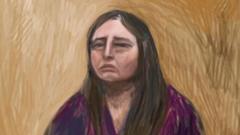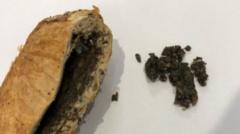Erin Patterson, on trial for the alleged murders of three relatives due to a toxic lunch, argues the incident was unintentional and discusses personal struggles with food.
Deadly Mushroom Lunch: Erin Patterson Denies Intent in Court Testimony

Deadly Mushroom Lunch: Erin Patterson Denies Intent in Court Testimony
Accused Australian woman claims she too fell ill from the contaminated meal.
In a sensational trial that has captured widespread attention in Australia and beyond, Erin Patterson, an Australian woman accused of murdering her relatives through a toxic mushroom lunch, took to the stand to assert that the incident was an accident. During her testimony in the Victorian Supreme Court, Patterson claimed she fell ill after consuming a large portion of dessert following the lunch in July 2023, which resulted in the tragic deaths of three of her guests.
Patterson, who faces charges of three counts of murder and one count of attempted murder, maintains that she only served what she thought were edible mushrooms during the beef Wellington meal at her home. Despite prosecutors alleging she deliberately included the deadly “death cap” mushrooms, Patterson argued that she consumed a small portion of the dish herself and that her subsequent illness was proof of her innocence.
The court was made privy to shocking revelations as Patterson admitted to fabricating a cancer diagnosis to entice her guests over for the meal, a detail that has cast further doubt on her story. She stated that she was too embarrassed to reveal her real reason for the gathering—the desire to undergo weight loss surgery.
The fatal meal led to the deaths of Patterson's former in-laws, Don and Gail Patterson, both aged 70, and Gail’s sister, Heather Wilkinson, aged 66. Only one guest, local pastor Ian Wilkinson, survived after extensive hospital treatment.
In her narrative to the jury, Patterson described her extensive cooking process, emphasizing her efforts to make the meal delicious while discussing her background of mushroom foraging, particularly for wild varieties. Despite this, she expressed uncertainty about the contents of the dried mushroom container, suggesting it may have contained lethal and foraged mushrooms alongside the edible variety.
On the lunch day, Ms. Patterson reminisced about the cherished memories of special occasions marked by her mother’s beef Wellington recipe. After serving her guests, she reported that her focus on entertaining resulted in only a small portion of the meal being consumed by her. After the guests departed, a dessert binge followed, leading to her feeling unwell and ultimately vomiting, which she attributed to overeating, not poison.
As the trial continues, Patterson’s history with bulimia has surfaced, raising further questions about her relationship with food and her claims regarding the events of that fateful lunch. Each detail unfolds a narrative that challenges not only the court's perception of guilt but also the very nature of human fragility amidst tragedy.
Patterson, who faces charges of three counts of murder and one count of attempted murder, maintains that she only served what she thought were edible mushrooms during the beef Wellington meal at her home. Despite prosecutors alleging she deliberately included the deadly “death cap” mushrooms, Patterson argued that she consumed a small portion of the dish herself and that her subsequent illness was proof of her innocence.
The court was made privy to shocking revelations as Patterson admitted to fabricating a cancer diagnosis to entice her guests over for the meal, a detail that has cast further doubt on her story. She stated that she was too embarrassed to reveal her real reason for the gathering—the desire to undergo weight loss surgery.
The fatal meal led to the deaths of Patterson's former in-laws, Don and Gail Patterson, both aged 70, and Gail’s sister, Heather Wilkinson, aged 66. Only one guest, local pastor Ian Wilkinson, survived after extensive hospital treatment.
In her narrative to the jury, Patterson described her extensive cooking process, emphasizing her efforts to make the meal delicious while discussing her background of mushroom foraging, particularly for wild varieties. Despite this, she expressed uncertainty about the contents of the dried mushroom container, suggesting it may have contained lethal and foraged mushrooms alongside the edible variety.
On the lunch day, Ms. Patterson reminisced about the cherished memories of special occasions marked by her mother’s beef Wellington recipe. After serving her guests, she reported that her focus on entertaining resulted in only a small portion of the meal being consumed by her. After the guests departed, a dessert binge followed, leading to her feeling unwell and ultimately vomiting, which she attributed to overeating, not poison.
As the trial continues, Patterson’s history with bulimia has surfaced, raising further questions about her relationship with food and her claims regarding the events of that fateful lunch. Each detail unfolds a narrative that challenges not only the court's perception of guilt but also the very nature of human fragility amidst tragedy.

















